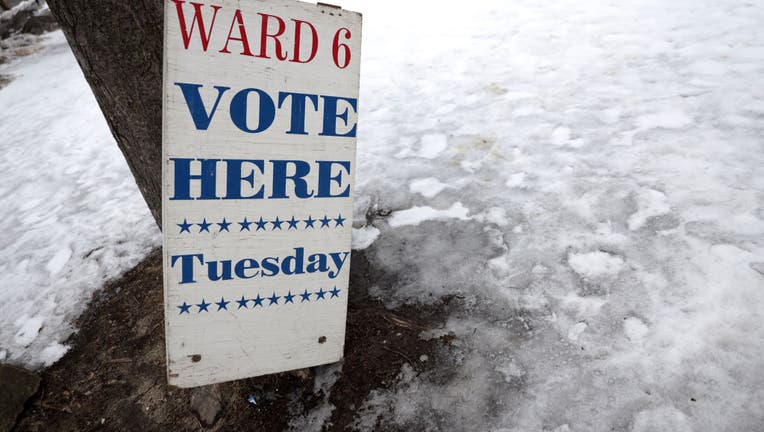Super Tuesday: What to watch as 14 states vote in pivotal primaries

A “VOTE HERE Tuesday” sign is placed outside Edmunds Middle School March 2, 2020 in Burlington, Vermont. Vermont will be one of the 14 states that hold Democratic presidential primaries on Super Tuesday. (Photo by Alex Wong/Getty Images)
SACRAMENTO, Calif. - The Democratic presidential candidates are racing toward the biggest day on the primary calendar, when 14 states vote on Super Tuesday. It's the day when the primary moves from retail to wholesale. Instead of one state voting at a time, candidates have to focus on contests in every region of the country with all types of voters.
Influence, money, delegates: Here’s what’s so super about Super Tuesday
While Super Tuesday won't necessarily determine who wins the nomination, it has historically been difficult for a candidate who performs poorly on the day to recover. Here's a look at Tuesday's contests:
THE STATES
Fourteen states hold primaries on Super Tuesday, including California and Texas, the two biggest delegate hauls of the entire primary season. California offers 415 delegates and Texas 228. In total, more than 1,300 delegates will be up for grabs, about a third of the total available in the race to the Democratic presidential nomination.
Although Super Tuesday was originally created as a regional primary featuring Southern states, it has morphed over the years. This year, it includes states from every region of the country.
The other states are Arkansas, Alabama, Colorado, Maine, Minnesota, Massachusetts, Vermont, Utah, North Carolina, Virginia, Tennessee and Oklahoma. Most of the Southern states are Republican strongholds in the general election, while others like California are solidly Democratic. North Carolina is likely to be a battleground state in the general election.
Polls close between 7 p.m. and 8 p.m. local time, depending on the state.
THE VOTERS
The Super Tuesday states are home to diverse electorates, both when it comes to demographics and political ideology. In California and Texas, white voters make up less than half the population. Latinos count for nearly 40% of the populations in both states. California, meanwhile, has the nation's highest Asian population, at roughly 15%. North Carolina, Tennessee, Virginia, Alabama and Arkansas have large populations of black voters, one of the Democratic Party's core voting blocs. The states blend a mix of urban and rural voters, as well as Democrats from all sides of the political spectrum. As candidates focus on wooing Southern Democrats in states like Texas and Arkansas, they must also be thinking about a message that can resonate in progressive San Francisco.
Which states vote on Super Tuesday?
Most of the Super Tuesday states have some form of widespread early voting. Voters in Minnesota, for example, could start casting ballots in January. Millions of mail-in ballots went out to California voters on Feb. 3, the day of the Iowa caucuses.
THE CANDIDATES
Vermont Sen. Bernie Sanders and former New York Mayor Mike Bloomberg have had the widest and most aggressive footprint across the Super Tuesday states, largely because they've got the money to spend. Bloomberg is advertising in all 14 states, while Sanders is on the airwaves in 12. It's the first time Bloomberg will be on ballots after he skipped the first four voting states, making the day a critical test of his theory that he's the best candidate to stand against Sanders and, later, Republican President Donald Trump.
Sanders spent Sunday in California, holding rallies in the San Francisco Bay Area and Los Angeles, the state's major liberal strongholds. He's hoping his monthslong focus on the state and resonance with Latino voters will help him win a large chunk of the state's 415 delegates. Massachusetts Sen. Elizabeth Warren will be in California on Monday, and Joe Biden plans to return on primary day.
Biden, for his part, hopes his strong showing in Saturday's South Carolina primary is a harbinger of coming success with black voters, who dominate the Democratic electorate in a handful of Super Tuesday states. Warren hoped to win her home-state primary, though Sanders is making a play for it. Bloomberg has also campaigned across the South in recent days as he tries to prove he can build a winning Democratic coalition.
Democrats opposed to Sanders are hoping to see voters coalesce behind a moderate alternative. Any of the candidates could face pressure to drop out if they don't perform well on Tuesday.
___

